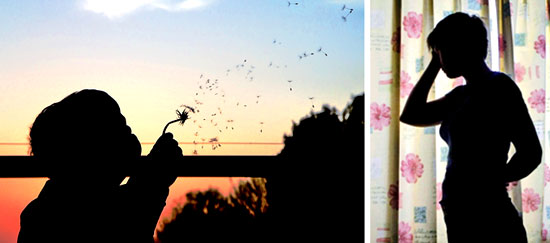
“...Uppannee piyaage nama liyana theeruwe..Piyaage nama irak une kohomada amme..”
As colloquial and non-literary as this song sounds, it sums up a massive issue and a lacuna in the Sri Lankan law on the legitimacy of children born out of wedlock. Illegitimate, fatherless, born to a mother with bad character, these words are not unknown to the Sri Lankan society.
 Children whose parents are not married at the time of their birth are considered as an unwanted result and a burden, in our culture.
Children whose parents are not married at the time of their birth are considered as an unwanted result and a burden, in our culture.
This is due to the reason that we have been trained and practised to look down upon these children, as they are born within an irregular family that is improper.
The problem does not lie on the improperness or the irregularity of the family, it lies on the mere non acceptance of the law that leads to both, the mother and the child being ignored and marginalized from society.
The legal background
The inception of the well-established legal framework on which this has been based runs back in time to the era of Dutch colonialism in Sri Lanka. The residuary law of Sri Lanka, moulded through the English laws have paved the pathway to the status-quo. The biblical teaching that God has created a woman for each man, and that a union of God should not be se parated has been the underlying understanding of the laws of marriage in Catholic and Christian societies, which has had quite an influence upon the general law of marriage in the country. It was the intention of lawmakers to regularize the heterosexual relationship between a man and a woman through legislation, for the purpose of which the laws on legitimacy; (hence the concept of illegitimacy) were enacted. During the initial period of post-enactment of these laws, the relationships between unmarried couples were frowned upon, and the children were considered to be filius nullius, i.e.the son of nobody. comparatively, the Roman-Dutch law provided space for a much more lenient stance on the basis of the phrase nec mater filio illegitimo parit, that a mother never gives birth to an illegitimate son.
Even though the biological relationship between a mother and her child has been accepted, the legal framework of legitimacy of the child is based on the nature of the relationship between the parents at the time the child was conceived. The father is considered to be the natural guardian of a child, being entitled to bear the maintenance, health and welfare of the child. Thus, he becomes a decisive factor in determining the legitimacy of the child. The nature of the parents’ relationship and its legal validity plays a pivotal role here. If the parents were unmarried when the child was born, s/he will be considered as an illegitimate child. These children can be legitimized afterwards if the parents get married. But, what is the solution left for mothers who are unable to marry the father of her child? The question remains.
One may argue that the presumption of legitimacy prevailing in the Evidence Ordinance can be taken up as conclusive proof. But, the fact of the matter is that this presumption is rebuttable, and the ways in which it can be rebutted are also given in the Ordinance itself, where the male should simply prove that he did not have access or an opportunity to have sexual intercourse with the female. The relief sought for illegitimate children is therefore simulated and cannot be used as a panacea for every matter.
How the mother is affected
It is not only a child that will be deprived of equality based on his or her legitimacy, but the mother also has to face numerous hardships. Children born out of wedlock are unable to receive admission to a government school in Sri Lanka, and in many cases, these mothers are not financially capable of sending their children to private or international schools either.
She may not be given a job opportunity, and can even be rejected by her own family. She is considered to be of bad character and shameless to bear a child without a father. Some women have to discontinue their education and career if they are unable to balance it with raising a child on their own.
The blame does not stop after her pregnancy. Sadly, these women sometimes have to go through very harsh words and hints of doctors and nurses when they go to the hospital for childbirth. The woman is not to bear the sole responsibility and be subjected to defamation.
What most of us do not think about is the fact that these women could be innocent victims of dishonest men, who are able to creep through the loopholes of the law and survive from the social pressure as well. Equality is a Fundamental Right of every citizen in the country.
No woman should be deprived of it merely because she is left with a child without a lawfully wedded husband. For all that matters, we should encourage these women and help them win their life goals while raising the child, not otherwise.
How the children are treated
These children are frowned upon by society, without an end. They are targeted and discriminated at school and the society as well. One should think twice before an innocent child is inhumanely discriminated for an act he is not responsible for. We should not continue to live in the paradox where we appreciate children to be the future of our society and country, while at the same time, discriminating him and breaking his personality and confidence to thrive as a human being worth living.
The irony
It is apparent that the conservative societies who granted us these laws have themselves changed their own legal framework to protect the rights of both, the mother and the child. The Convention on the Rights of the Child to which Sri Lanka has for long been a signatory clearly states that children should not be discriminated and deprived of equality, due to their birth or other status, meaning legitimacy. But, it is sad to see, we as a nation continue to cling on to inequitable and prejudicial laws that affect both women and children in our society.
Many women’s rights activists argue that in a world where even homosexuality has been legally accepted and where the concept of living together prior to marriage has been openly welcome, such patriarchal and feudalistic ideologies should be kept away from the minds of people.
Time to move on!
There is an epigram within our folklore that once a mother elephant gives birth to a baby, every female elephant in the herd starts lactating. Similarly, a mother lactates solely because of the birth of the child, regardless of whether the child is legitimate or not. Motherhood has been celebrated and worshipped throughout our civilization. But, what these outdated concepts tell us is to frown upon the same motherhood on illogical reasoning.
Married or not, a woman is able to take care of her child, though she may be comparatively incapacitated than a mother with the husband’s financial support. It is society itself that discourages these women and purposely makes them vulnerable and marginalized. We live in a world where many illegitimate children have been born and bred under the shadow of strong mothers. It is therefore time that our society takes the initiative to eradicate these unreasonable and senseless concepts from our mind-set and give priority to the well-being of women and children of the country.
